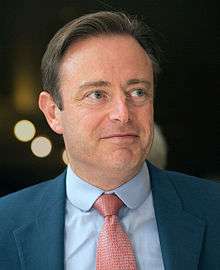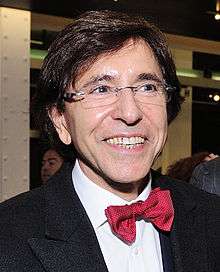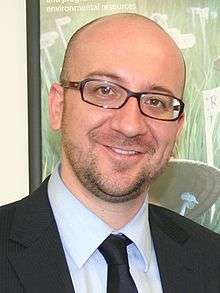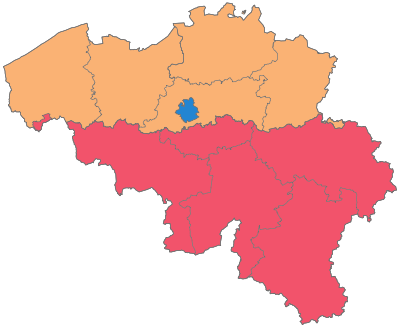Belgian federal election, 2019
|
| |||||||||||||||||||||||||||||||||||||||||||||||||||||
All 150 seats in the Chamber of Representatives 76 seats needed for a majority | |||||||||||||||||||||||||||||||||||||||||||||||||||||
|---|---|---|---|---|---|---|---|---|---|---|---|---|---|---|---|---|---|---|---|---|---|---|---|---|---|---|---|---|---|---|---|---|---|---|---|---|---|---|---|---|---|---|---|---|---|---|---|---|---|---|---|---|---|
| |||||||||||||||||||||||||||||||||||||||||||||||||||||
| |||||||||||||||||||||||||||||||||||||||||||||||||||||
The next Belgian federal election will take place on the same day as the 2019 European Parliament elections and the 2019 Belgian regional elections, being 26 May 2019, unless snap elections are called.
In the election, all 150 members of the Chamber of Representatives will be elected in eleven multi-member constituencies.
Background
Following the 2014 elections, a centre-right government consisting of N-VA, CD&V, Open Vld and MR was formed, led by Prime Minister Charles Michel (MR). The government coalition is unique in several aspects: the N-VA participates for the first time, the MR is the only French-speaking party, and the French-speaking Socialist Party is not part of the government for the first time in 25 years.
Local elections are scheduled for October 2018. Unless snap elections are called, the 2019 elections will be held only several months after the local elections.
Electoral system
The 150 members of the Chamber of Representatives will be elected in 11 multi-member constituencies, being the ten provinces and Brussels, with between 4 and 24 seats. Seats are allocated using the d'Hondt method, with an electoral threshold of 5% per constituency.[1]
Representatives elected from the five Flemish provinces, Antwerp (24), East Flanders (20), Flemish Brabant (15), Limburg (12) and West Flanders (16), automatically belong to the Dutch-speaking language group in parliament, whereas those elected from the five Walloon provinces, Hainaut (18), Liège (15), Luxembourg (4), Namur (6) and Walloon Brabant (5), form the French-speaking language group. The 15 members elected in Brussels may choose to join either group, though de facto only French-speaking parties reach the threshold. Apportionment of seats is done every ten years, last by royal order of 31 January 2013.
The 60-member Senate is composed of 50 representatives from the regional and community parliaments, plus 10 co-opted senators proportionally divided among parties based on the result of the federal election.
All Belgian citizens aged 18 or over are obligated to participate in the election. Non-Belgian citizens residing in Belgium (regardless of EU citizenship) cannot vote, whereas Belgian citizens living abroad may register to vote.
Date
The 2011–14 state reform changed several aspects regarding federal elections. Starting with the May 2014 election, which coincided with European Parliament and regional elections, the federal parliament is elected for a five-year term rather than a four-year term.
The federal elections would from now on always coincide with the European Parliament elections;[2] snap federal elections would trigger a parliamentary term lasting until the next European Parliament elections.[3] However, as of 2017, a law needed for this to take effect has not been enacted. Given the five-year term for all three elections, they will all coincide in 2019 regardless, unless snap federal elections are called.
Additionally, de facto practice is to formally dissolve parliament and trigger new elections by Declaration of Revision of the Constitution shortly before regular expiry of the parliamentary term.
Parties and leaders
| Political party | Party leader | Seats | |||||
|---|---|---|---|---|---|---|---|
| Flemish parties in Parliament | |||||||
| New Flemish Alliance (N-VA) | Bart De Wever (since 2004, re-elected in 2008, 2011, 2014 and 2017) | 33 (government) | |||||
| Christian Democratic and Flemish (CD&V) | Wouter Beke (since 2010, re-elected in 2016) | 18 (government) | |||||
| Open Flemish Liberals and Democrats (Open Vld) | Gwendolyn Rutten (since 2012, re-elected in 2016) | 14 (government) | |||||
| Socialist Party Different (sp.a) | John Crombez (since 2015, defeating incumbent Bruno Tobback) | 13 (opposition) | |||||
| Green (Groen) | Meyrem Almaci (since 2014) | 6 (opposition) | |||||
| Flemish Interest (Vlaams Belang) | Tom Van Grieken (since 2014) | 3 (opposition) | |||||
| French-speaking parties in Parliament | |||||||
| Socialist Party (PS) | Elio Di Rupo (since 1999, except during 2011-2014 while Prime Minister) | 23 (opposition) | |||||
| Reformist Movement (MR) | Olivier Chastel (since 2014, replacing Charles Michel who became Prime Minister) | 20 (government) | |||||
| Humanist Democratic Centre (cdH) | Benoît Lutgen (since 2011) | 9 (opposition) | |||||
| Ecolo (Ecolo) | Zakia Khattabi & Patrick Dupriez (since 2015) | 6 (opposition) | |||||
| Democratic Federalist Independent (DéFI) | Olivier Maingain (since 1995) | 2 (opposition) | |||||
| People's Party (Parti Populaire) | Mischaël Modrikamen (since 2009) | 1 (opposition) | |||||
| National (bilingual) parties in Parliament | |||||||
| Workers' Party (PVDA-PTB) | Peter Mertens (since 2008) | 2 (opposition) | |||||
Retiring incumbents
The following incumbent members of the Chamber of Representatives announced their retirement from politics:
- Hans Bonte (sp.a, Flemish Brabant)[4]
- Peter Dedecker (N-VA, East Flanders)[5]
- Alain Mathot (PS, Liège)[6]
- Laurette Onkelinx (PS, Brussels)[7]
- Dirk Van der Maelen (sp.a, East Flanders)[8]
- Eric Van Rompuy (CD&V, Flemish Brabant)[9]
- Jan Vercammen (N-VA, West Flanders)[10]
Opinion polls
See also
References
- ↑ Electoral system IPU
- ↑ Article 65 of the Belgian Constitution
- ↑ Article 46 of the Belgian Constitution
- ↑ "Hans Bonte stopt met nationale politiek". De Morgen. 23 April 2018.
- ↑ "Peter Dedecker (N-VA) stopt in 2019 met actieve politiek". De Standaard. 11 December 2017.
- ↑ "Alain Mathot annonce renoncer à se présenter aux prochains scrutins". Le Vif. 30 June 2018.
- ↑ "Onkelinx stopt met actieve politiek in 2019". De Standaard. 13 September 2017.
- ↑ "SP.A'er Dirk Van der Maelen is geen kandidaat meer in 2019". deredactie.be. 5 July 2017.
- ↑ "Eric Van Rompuy stopt in 2019: 'Er is een tijd van komen en gaan'". De Standaard. 7 February 2017.
- ↑ "N-VA-Kamerlid Jan Vercammen houdt ermee op". Focus WTV. 21 February 2018.






